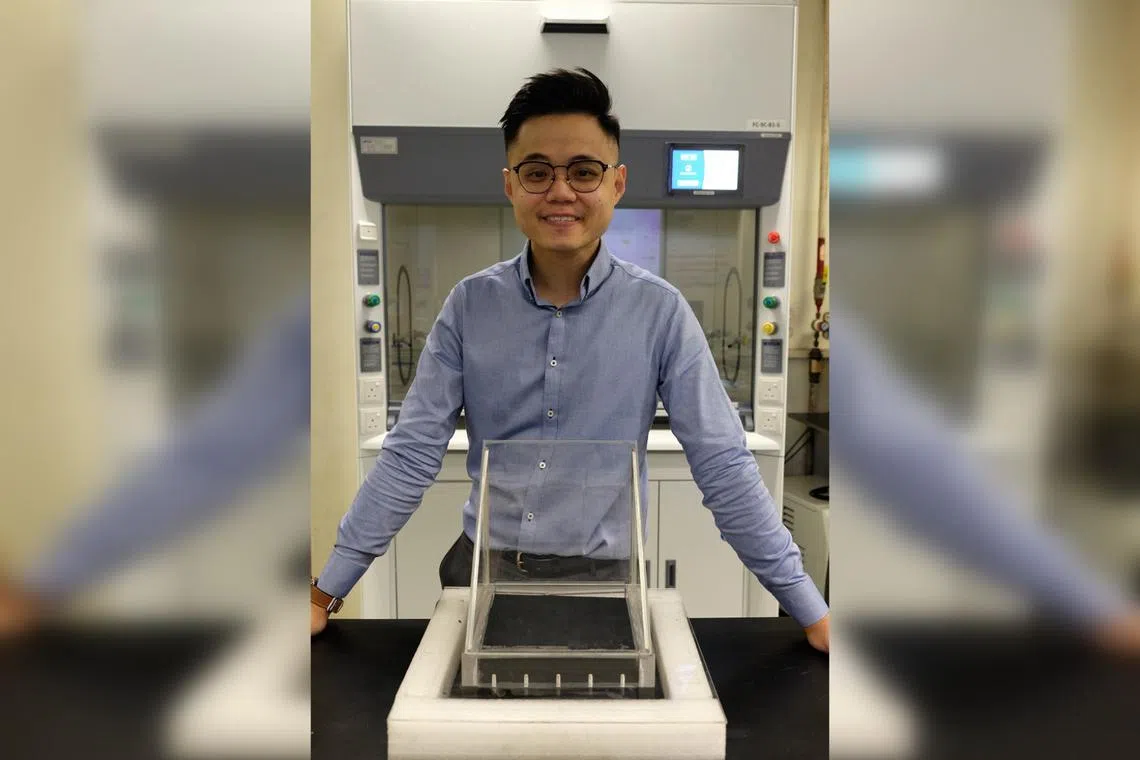NTU scientist turns fruit waste into material that can be used in water purifier
Sign up now: Get ST's newsletters delivered to your inbox

Dr Edison Huixiang Ang with his solar still, which uses MXenes synthesised from fruit waste.
PHOTO: NTU SINGAPORE
SINGAPORE - A Nanyang Technological University scientist has developed an ultra-thin material made from recycled fruit with exceptional light-to-heat conversion efficiency that can be used in equipment to purify dirty water.
Assistant Professor Edison Ang successfully used coconut husks, orange peels and banana peels to make MXenes, an electrical-conducting compound with similar properties to graphene, which is commonly used in the electronics industry. In a previous study, he also managed to synthesise graphene-related materials from recycled plastic.
Unlike graphene, MXenes are made from other elements besides carbon, giving them better light-to-heat conversion property, and the two-dimensional layered structure has multiple opening channels that allow for water to pass through easily.
MXenes are also outstanding electrical conductors, hundreds of times stronger than steel, and extremely light. Their exceptional properties enable them to replace conventional materials in industrial applications such as energy storage, optical and sensors.
As raw materials need to be mined for their synthesis, MXenes are expensive and complicated to process.
Asst Prof Ang has devised a simple method where fruit peel is carbonised to make MXenes.
“Our synthesis process is three times cheaper than commercial methods because the original source that we use (fruit waste) is free of charge,” he said in an interview on Jan 13.
For now, Asst Prof Ang plans to use his MXenes in solar stills, which use sunlight to distil dirty water.
Distillation, which takes place in an enclosed space, uses heat to boil the dirty water to get pure water vapour, which is then cooled to become liquid. Traditional distillation requires well-established infrastructure, significant energy costs, and thus is only affordable in developed countries.
Only a thin layer of Mxene is needed to conduct heat from the sun to evaporate the water, so no fossil fuel is required. This makes Asst Prof Ang’s solar still cheaper, more portable and environmentally friendly than existing methods of distillation.
The solar stills can be used in disaster zones and rural areas, where fuel and clean water are usually scarce.
He said: “It (a solar still) doesn’t require any electricity because we’re using renewable solar energy, so it is very easy to deploy. As long as you have sunlight, you can use it.
“This will be especially beneficial to the underprivileged community… When we tested our water quality against PUB standards, we met those drinking standards.”
Asst Prof Ang also plans to use his MXene in applications such as energy storage and battery manufacturing. He is currently unable to disclose which companies he is working with due to confidentiality clauses.
Correction note: An earlier version of this article incorrectly designated Assistant Professor Edison Ang from NTU as Professor Edison Ang. It also incorrectly stated that plastic waste and fruit peels were both converted into MXenes. We are sorry for the errors.


